Gardening for Mental Health
This article delves into the many mental health benefits of gardening. We'll explore some of the science, including the concept of horticultural therapy and the psychology of gardening. We'll also look at some gardening mental health statistics, which provide compelling evidence of the positive impact of gardening on mental wellbeing. May is Mental Health Awareness month, but these benefits aren’t limited to a particular timeframe. Whether you're a new, seasoned, or senior gardener, the act of growing can boost your mental health on an ongoing basis.
In This Article
On a Personal Note
Allow me a quick editorial interjection: gardening has changed my life. Like many, I was diagnosed with depression and anxiety years ago and have experimented with therapy, medication, and so on. I was also advancing a career in tech and had poor work-life balance, was disconnected from my food system, and had gained weight from a sedentary lifestyle. I realized that puttering around my yard and pulling out weeds made me feel more active and purposeful. Over the next couple of years I started gardening more, quit my tech job, joined a landscape gardening crew full-time, took a vegetable gardening intensive, and assumed the role of Copywriter at Gardener’s Supply. I’m now pursuing a Master Gardener certification, I’ve become healthier through working outside and growing my own food, and I’ve built community connections that teach and inspire me. I can say I feel happier than ever, and that positioning gardening at the center of my life continues to yield fruit. If you were to walk around the Gardener’s Supply offices in Vermont, you’d encounter many other employee-owners with similar stories. And you can tap into the benefits of gardening, too!
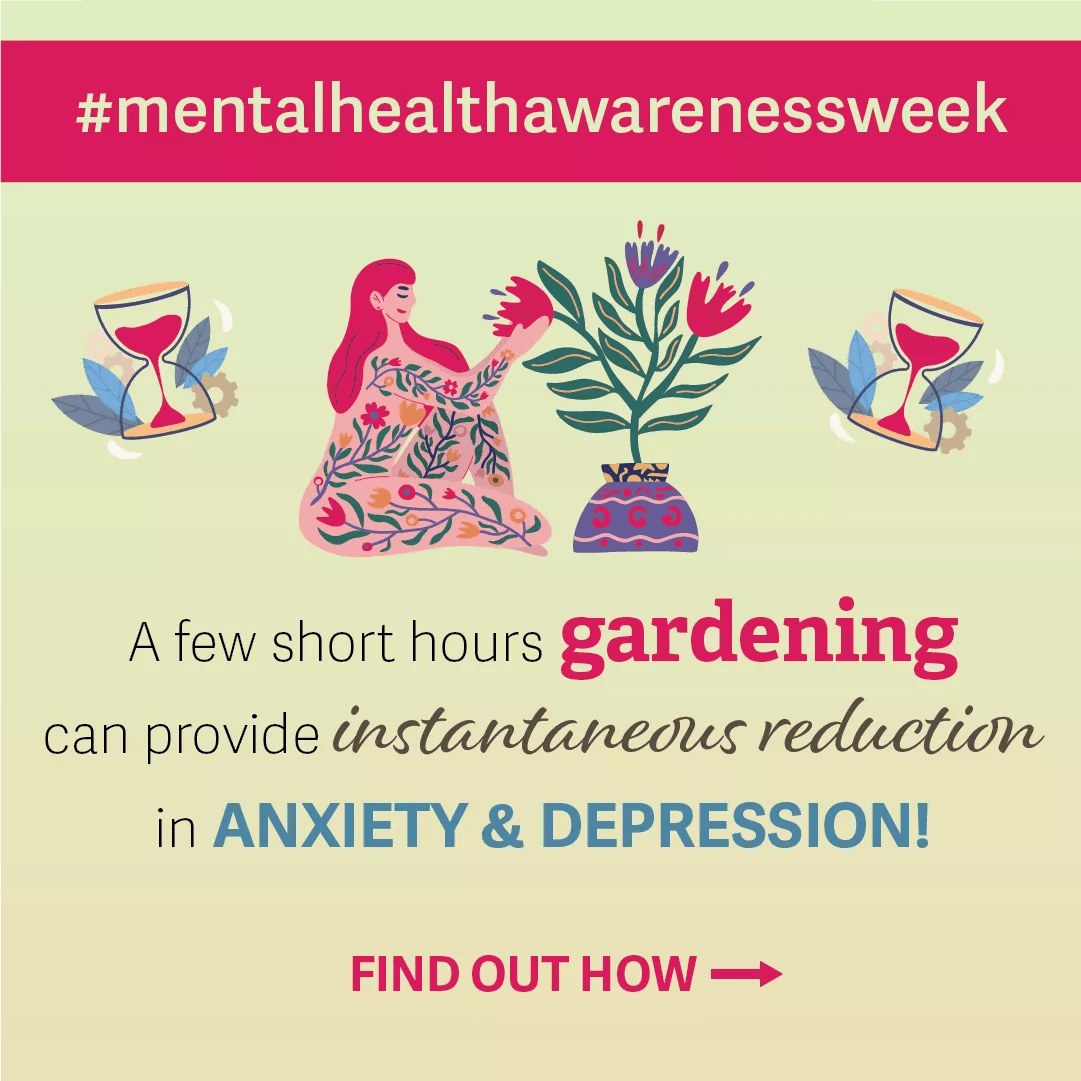
The Therapeutic Power of Gardening
Planting and tending a garden has a calming effect on the mind. In fact, gardening is often associated with mindfulness. The repetitive nature of many gardening tasks and the wonder of being in nature encourage the gardener to stay focused on the present moment. This focus is crucial for reducing stress and anxiety.
Key therapeutic elements of gardening include:
- Mindfulness: Engaging fully with the task at hand
- Exercise: Gentle, yet beneficial for overall health
- Connection with nature: Reduces feelings of isolation
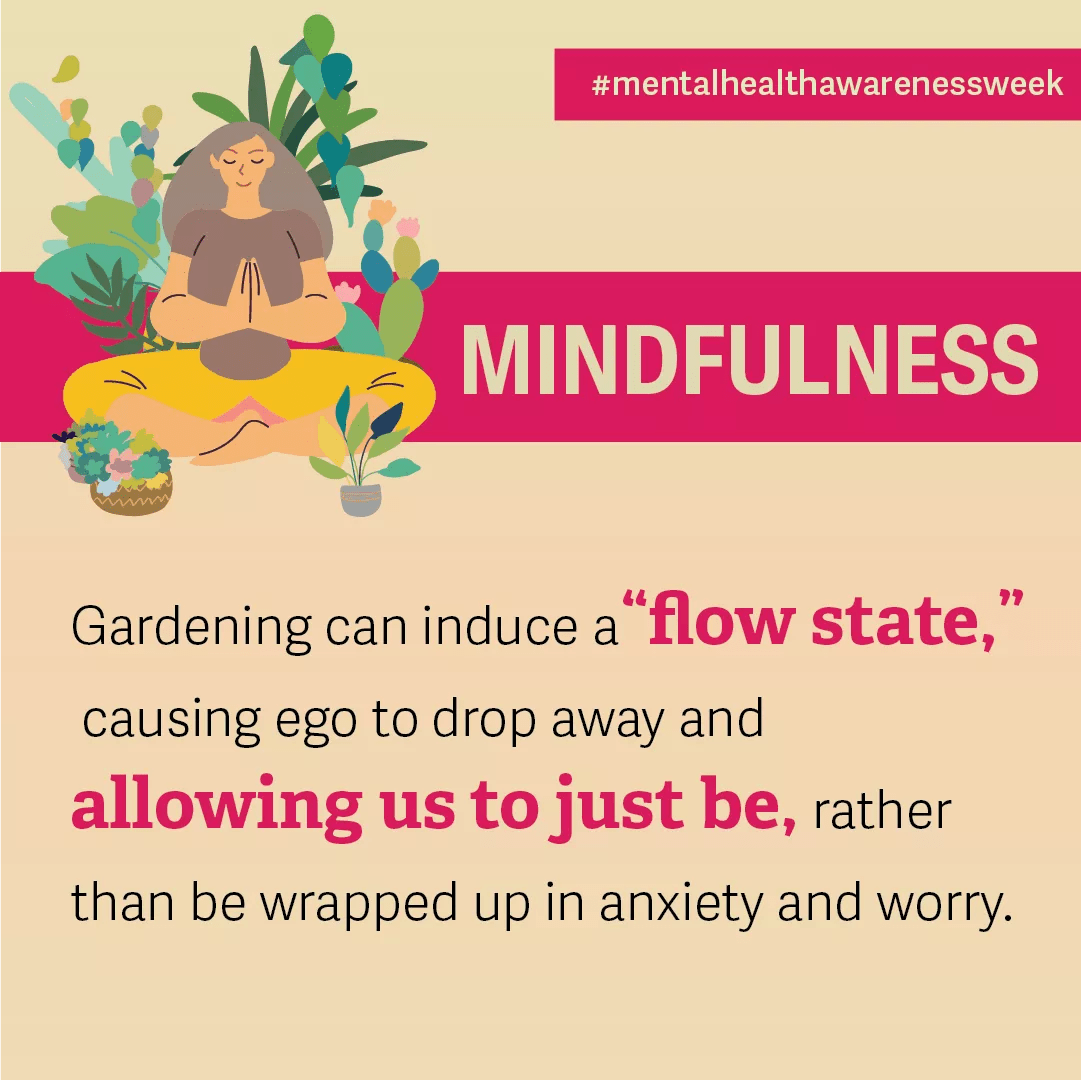
Gardening can also yield a feeling of accomplishment that improves self-esteem. Completing a task, like planting a flower bed, can boost confidence and mood. Social connection is yet another benefit. Community gardening groups, in particular, offer a space for collaboration and shared experiences. Such settings foster friendships and a sense of belonging. Ultimately, gardening’s therapeutic power lies in its ability to ground us. It provides an anchor amidst life’s chaos, offering both purpose and tranquility.
Understanding Horticultural Therapy
Horticultural therapy involves the use of plants and gardening activities to support health and wellbeing. This practice is increasingly recognized for its effectiveness in mental health treatment. Professionals use horticultural therapy in various settings including hospitals, rehabilitation centers, and schools. The therapy helps individuals with diverse needs and challenges. The benefits of horticultural therapy are profound. It encourages physical activity, boosts cognitive skills, and improves emotional wellbeing. People often feel more relaxed and focused during and after such therapy sessions.
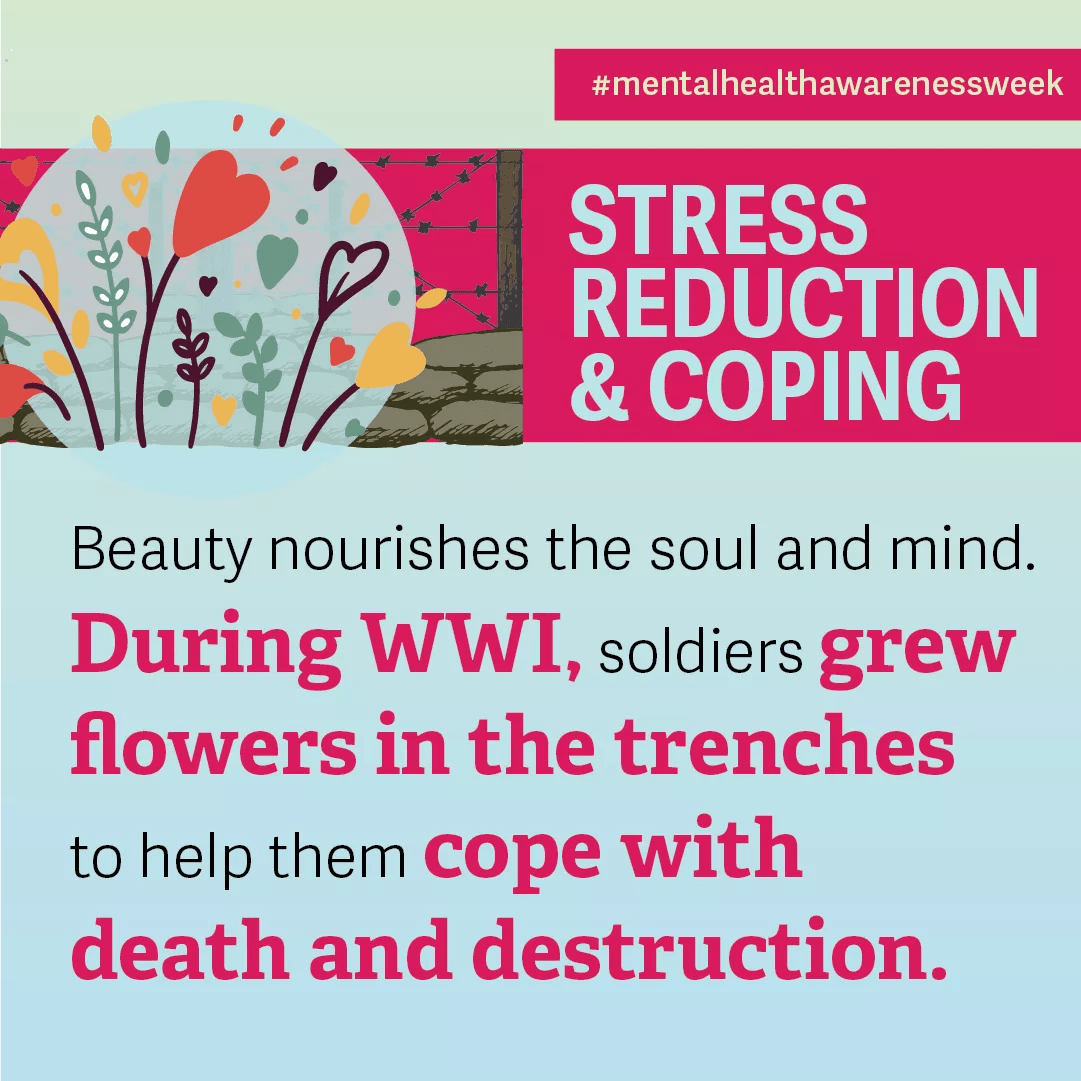
Understanding Nature Therapy
Nature therapy involves activities that connect us with the natural world. Gardening can play a significant part in this therapeutic practice that’s linked to reduced stress levels and improved mood. Studies show that exposure to nature can lower cortisol levels. Cortisol is a stress hormone, and lower levels are beneficial for mental health. So, engaging with nature leads to a calmer and more balanced state. The concept of biophilia also plays a role here. It suggests an innate human desire to connect with nature; this connection enhances our sense of wellbeing and happiness. Nature therapy emphasizes the restorative power of natural settings. Spending time surrounded by plants and greenery can enhance focus and creativity. It’s a powerful antidote to modern life’s digital stressors, and can give us a sense of agency in the face of crises like climate change. Incorporating nature therapy into daily routines can be simple. Even a brief walk through a garden or sitting in a park yields benefits.
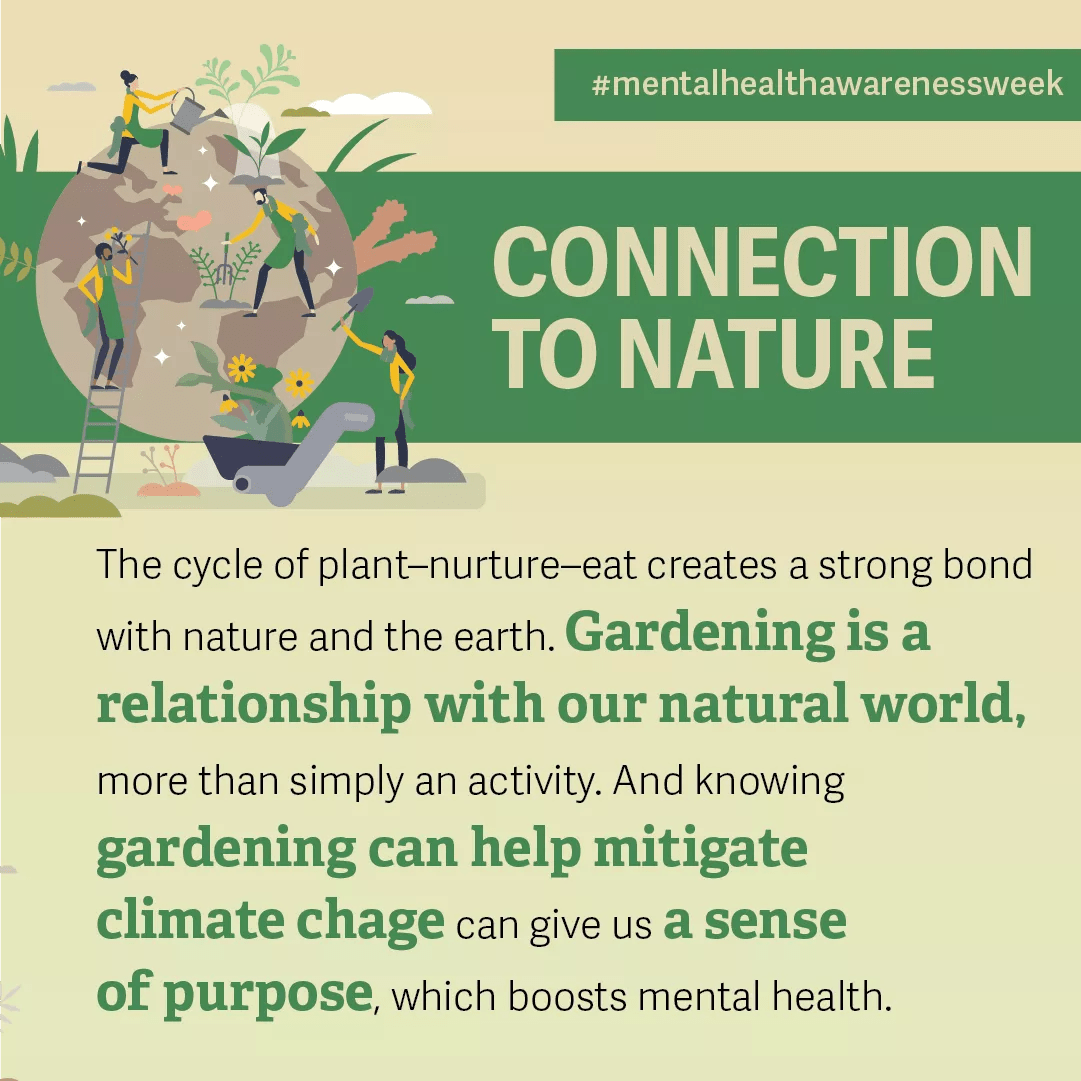
Gardening for Mental Health: Studies and Statistics
There are many studies and statistics that reveal significant insights into the mental health benefits of gardening. Research consistently shows those who garden regularly experience better mental health. The impact of gardening on emotional wellbeing is evident. In 2021, the UK’s Royal Horticultural Society released research revealing those who garden daily have wellbeing scores 6.6% higher and stress levels 4.2% lower than people who don’t garden at all. Surveying more than 6,000 people, the research demonstrates a significant link between more frequent gardening and improvements in wellbeing, perceived stress, and physical activity.
The Rutgers University Department of Plant Biology website agrees, “An increasingly large body of research attests to the unique values of horticulture as a therapeutic modality for people with physical, mental, emotional, and social disabilities, as plants are non-discriminating and non-threatening, and anyone can be successful utilizing this medium.” A HealthCentral article quotes Hannah Brents, LICSW, of Safe Talk Therapy in Boston. “Putting your hands in the soil releases feel good chemicals in the brain and grounds the nervous system,” she explains.
A 2023 University of Colorado study found that “Study participants…saw their stress and anxiety levels decrease, with those who came into the study most stressed and anxious seeing the greatest reduction in mental health issues.” Plus, the study “confirmed that even novice gardeners can reap measurable health benefits of the pastime in their first season.” Indoor gardening can also provide year-round benefits. A 2015 study found that “interaction with indoor plants may reduce psychological and physiological stress by suppressing autonomic nervous system activity in young adults.”
There are many other universities, community agencies, and other research entities who continue to study and publish data on the tangible effects of gardening. Not only does it improve day-to-day mood, but it also contributes to long-term mental and overall health. As the demand for natural therapies grows, these studies and statistics gain importance. They underscore the therapeutic potential of gardening in diverse settings.
The Psychology of Gardening
So why and how does growing benefit the mind? Gardening means direct interaction with the natural world, satisfying the deep human urge to nurture and cultivate life. This act of nurturing contributes to that sense of purpose and accomplishment. Engagement with plants and soil is therapeutic. The tactile experience of gardening stimulates the senses. Such stimulation can invoke a sense of calm, acting as a natural stress reliever. Psychologically, gardening provides structure and routine, which can be valuable for individuals struggling with mental health issues. Routine activities offer predictability and stability, which are comforting in uncertain times. That said, gardening also teaches us to accept that some things are beyond our control—like the weather or presence of particular pests. Finally, designing and growing a garden lets individuals express creativity. This creative expression can be freeing and healing, driving satisfaction and emotional equilibrium.
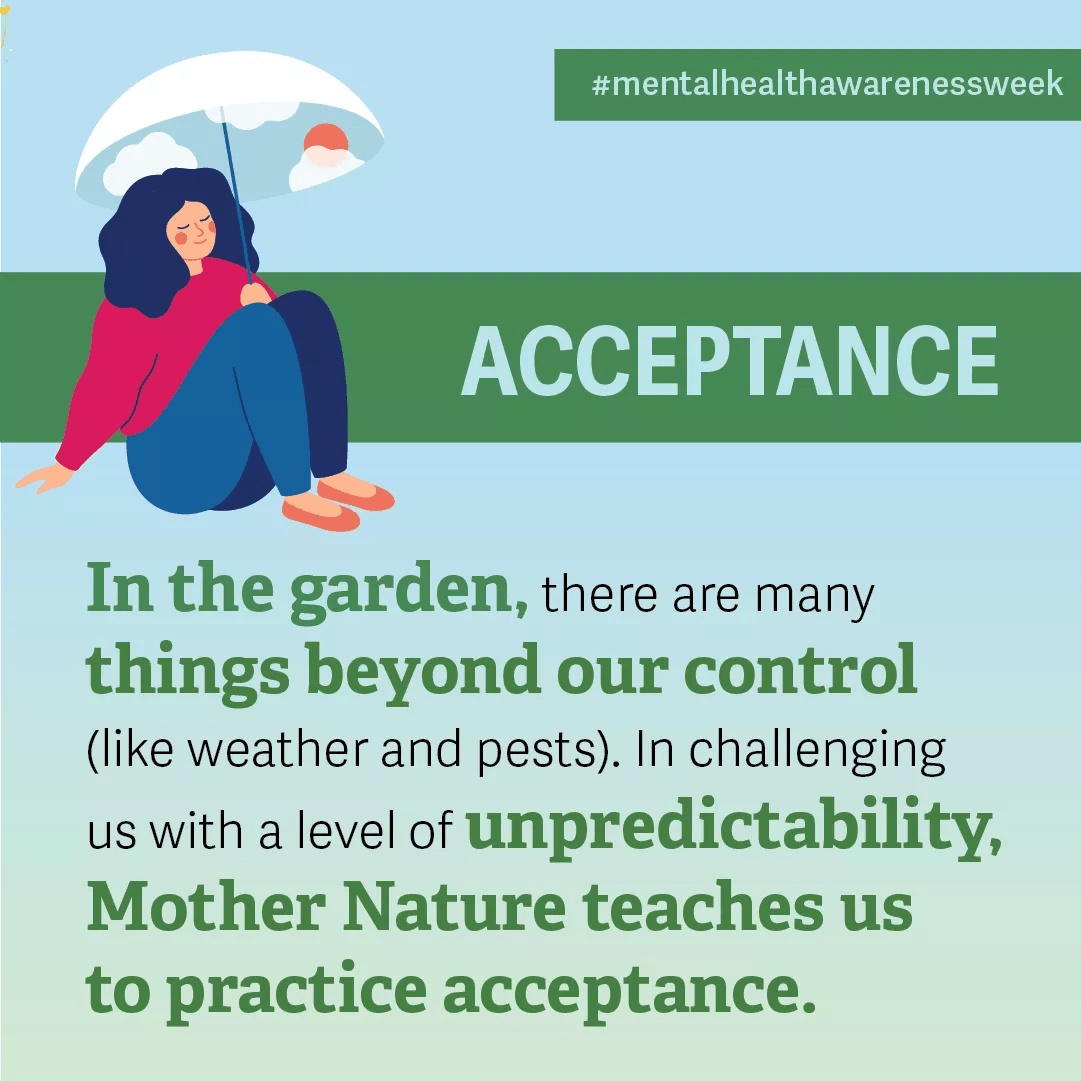
Key Benefits of Gardening for Mental Health
Gardening offers numerous physical and mental health benefits. It’s a natural mood booster and stress reliever. Methodical gardening tasks involved are calming and meditative, and gardening provides sensory stimulation. This includes the feel of the soil, the smell of plants, and the vibrant colors of flowers. These sensory experiences uplift and energize the mind and again ground the gardener in the present moment.
Of course, the benefits of gardening for mental health extend beyond emotional wellbeing:
- Improves cognitive functions: Enhances memory and concentration
- Promotes physical health: Involves exercise, which boosts overall fitness
- Facilitates social connection: Community garden groups foster relationships
- Encourages mindfulness: Focus on present tasks reduces stress
- Cultivates emotional resilience: Facing gardening challenges builds mental fortitude
These benefits make gardening an invaluable tool for supporting mental health. The inclusive nature of gardening means it can be adapted for all ages and abilities. Thus, it holds potential as a lifelong support for mental wellness.
Mood Enhancement and Stress Reduction
Being outside and getting our hands in the soil puts us in direct contact with microorganisms and beneficial bacteria that can improve mental health. Mycobacterium vaccae, for example, can trigger a release of serotonin in the brain. This neurochemical is key to feeling happy and relaxed. The natural sunlight absorbed during gardening increases vitamin D. Higher vitamin D levels are linked to improved mood. Sunlight also helps regulate sleep patterns, crucial for managing stress. Additionally, gardening involves repetitive tasks that soothe the mind—like weeding. These activities are often described as meditative, allowing individuals to escape daily stressors and experience relaxation.
Cognitive Function and Dementia Prevention
Gardening supports cognitive health. Regular gardening can improve memory and concentration. It stimulates the brain through planning and problem solving. For older adults, gardening may delay dementia onset. Studies show those who garden have a lower risk of cognitive decline. Engaging with plants can sharpen mental faculties over time. The mental exercise involved in gardening keeps the brain active. It challenges individuals to think, plan, and adapt. These activities contribute to brain health and longevity, making gardening a protective factor against age-related cognitive issues.
Physical Health and Exercise
Gardening is a wonderful form of exercise that combines low-impact activities with natural movement. Tasks like digging, planting, and weeding make excellent workouts. The physical effort expended in gardening enhances strength and flexibility. It promotes cardiovascular health and increases stamina. Regular gardening helps maintain a healthy weight. Furthermore, gardening as exercise is accessible to all. It supports individuals across age groups and physical capabilities. The flexibility of gardening ensures it can be a part of anyone’s ongoing fitness routine. Finally, growing your own healthy produce grants you full control over the inputs and process—you can implement organic practices and feel more confident about the integrity of your diet and gut health, which in turn benefits other bodily functions.
Social Interaction and Community Building
In a world where isolation is rampant, gardening encourages social connection. Working in community gardens or learning with a group cultivates relationships. It provides opportunities for interaction and shared experiences. Collaborating with others fosters a sense of belonging. It builds emotional support networks and friendships. It also enhances social cohesion and strengthens community ties. Through shared goals and achievements, gardening fosters healthy, supportive communities.
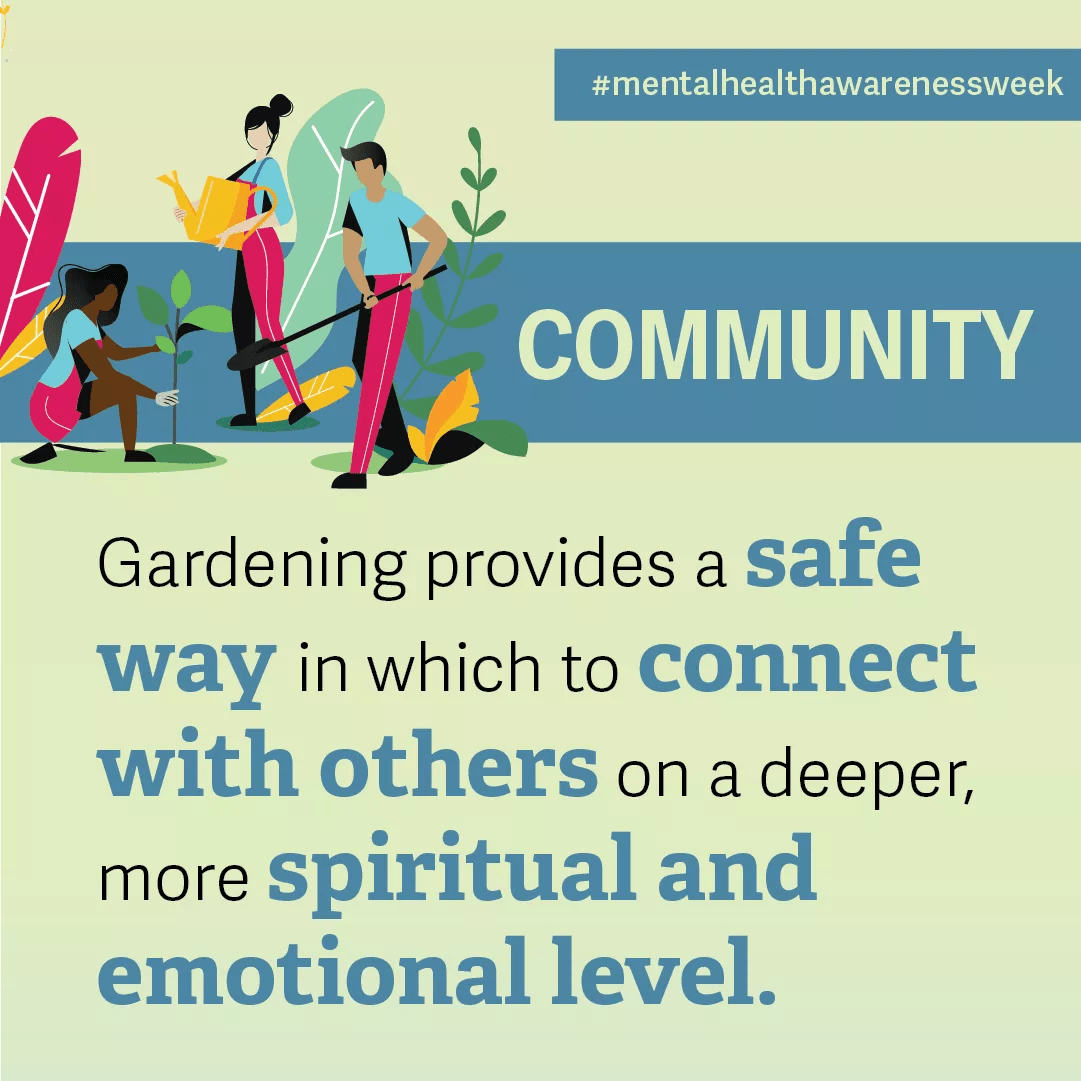
How to Start Gardening for Your Mental Health
Starting a garden for mental health benefits is straightforward—and you’ve come to the right place to learn more. First, assess available space: whether that’s a yard, balcony, or windowsill, you can start a garden. Just ensure the area receives sunlight and can accommodate plants. Next, choose plants that fit your environment. Consider climate, soil type, and sunlight. Equip yourself with basic tools. Essential items include gloves, a trowel, and pots or planters. Gather any needed supplies ahead of time to ensure you’re prepared for planting and maintenance.
Here are the basic steps to launching your gardening journey:
- Plan: Sketch a layout for plant arrangement
- Prepare: Use quality soil and compost for planting
- Plant: Follow instructions for each type of plant
- Tend: Water consistently and manage weeds
- Harvest: Pick, process, and preserve your plenty
- Expand: Add new plants as skills improve!
Designing a Therapeutic Garden
A therapeutic garden is designed for mental wellness and offers peace and sanctuary. Choose a tranquil setting that encourages relaxation. Incorporate elements that appeal to the senses and choose plants with soothing qualities. Lavender and chamomile, for example, are excellent for fragrance. Soft foliage and colorful blooms can create visual appeal and relaxation. Design paths and seating within your garden; use stones or wood to create walkways. Add a comfortable chair or bench to invite pause and reflection. For added ambiance, consider a water feature; the sound of flowing water can enhance tranquility. Finally, personalize the space. Let your garden reflect your authentic personality and preferences.
Gardening Activities for Mindfulness and Relaxation
Gardening activities can serve as excellent mindfulness practices. They encourage presence and attentiveness to the task at hand. These practices foster relaxation and mental clarity. Begin with planting, a deeply meditative activity. Focus on the feel of the soil and the placement of each seed. The simplicity of the task centers the mind and calms emotions. Pruning and weeding further support mindfulness. As you trim or clear, remain focused on each movement. These acts require care and attention, promoting deliberate presence. Additionally, walking through your garden can be a mindful experience. Engage with each plant visually and tactilely. Notice colors, textures, and fragrances as you stroll. You can even do some garden yoga. Incorporating these mindful gardening activities can enhance wellbeing. They provide an opportunity to disconnect from stressors. Instead, you'll immerse yourself in nature's rhythms, achieving peace and relaxation.
Conclusion: Cultivating Mind and Body Through Gardening
Gardening for mental health offers a holistic path to wellbeing. By nurturing plants, we also nurture our minds and bodies. This harmonious connection to nature provides therapeutic benefits both profound and accessible. Whether through reducing stress, improving mood, or fostering community, gardening is a powerful tool for healing. As we engage with the natural world, we find tranquility and purpose. Embrace gardening as part of a balanced lifestyle, in which the act of cultivation becomes a journey toward overall wellness and inner peace.
Gardening for Mental Health FAQs
1. How does gardening improve mental health?
As covered in this article, gardening improves mental health by reducing stress, anxiety, and depression through physical activity, mindfulness, and connection to nature. The act of nurturing plants boosts self-esteem and yields a sense of accomplishment. Studies show that exposure to green spaces can lower cortisol levels and improve mood. Whether you’re tending one small indoor plant or maintaining an expansive backyard plot, gardening offers a natural and therapeutic way to enhance emotional wellbeing.
2. Can gardening help with anxiety and depression?
Yes, gardening is an effective tool for helping to manage anxiety and depression. Engaging with plants and soil promotes mindfulness, helping you stay present and calm. Rhythmic, hands-on gardening tasks can be meditative, reducing anxious thoughts. Additionally, spending time outdoors increases sunlight exposure, which supports the production of serotonin—a natural mood booster. Gardening gives a sense of routine and purpose, key elements that support mental health recovery and emotional balance.
3. What are the best plants for mental wellbeing?
The best plants for mental wellbeing include lavender, chamomile, aloe vera, and jasmine. These plants not only purify the air but also have calming aromas known to reduce stress and anxiety. Lavender and chamomile can promote relaxation and sleep, while jasmine's scent may improve mood. Growing herbs and flowers with soothing properties enhances your garden’s therapeutic benefits, making your space a peaceful sanctuary for mental health.
4. How much time should I spend gardening for mental health benefits?
Spending just 30 minutes a few times a week gardening can benefit mental health. Research suggests that even short sessions outdoors reduce stress, improve mood, and enhance cognitive function. The key is consistency—regular exposure to nature and plant care creates a calming routine.
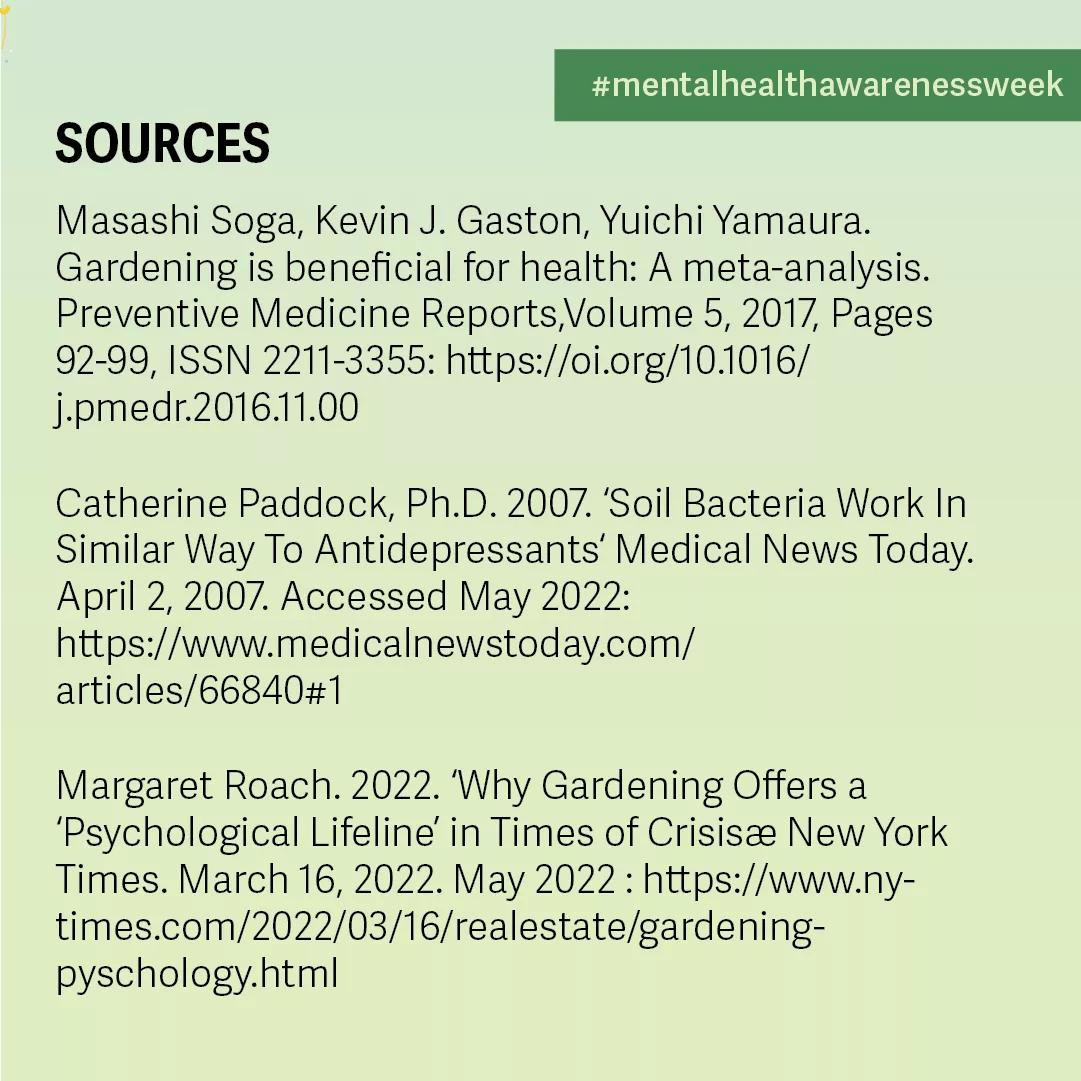
Additional Sources
- https://systematicreviewsjournal.biomedcentral.com/articles/10.1186/s13643-024-02457-9
- https://www.rhs.org.uk/advice/health-and-wellbeing/articles/why-gardening-makes-us-feel-better
- https://www.sciencedirect.com/science/article/pii/S0264275121000160?via%3Dihub
- https://plantbiology.rutgers.edu/undergraduate/horticultural-therapy/what-is
- https://www.healthcentral.com/mental-health/gardening-good-for-mental-health
- https://neurosciencenews.com/gardening-mental-health-cancer-22190/
- https://pmc.ncbi.nlm.nih.gov/articles/PMC4419447/
Print this Article:
Get the Dirt
Stay up to date on new articles and advice. Please fill out the information below.

